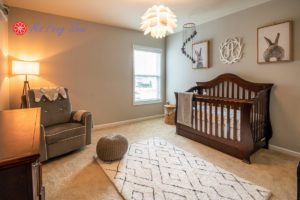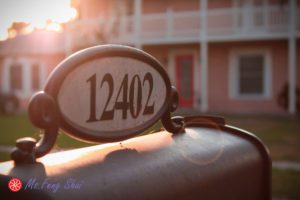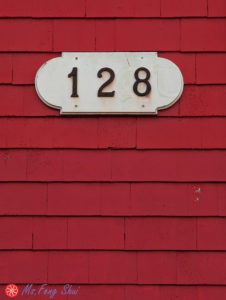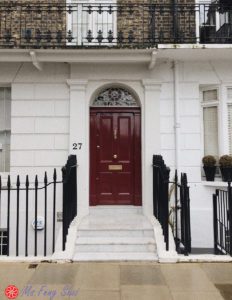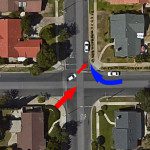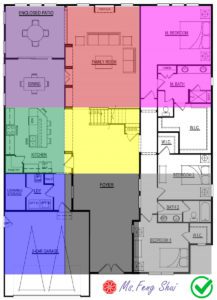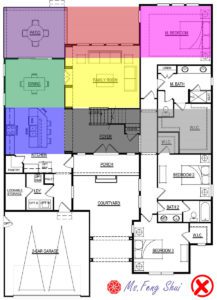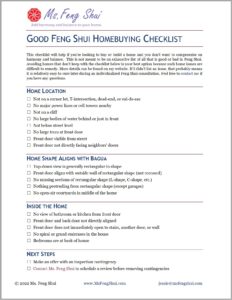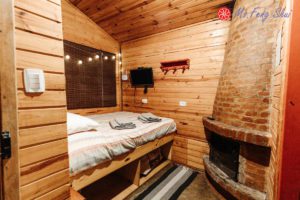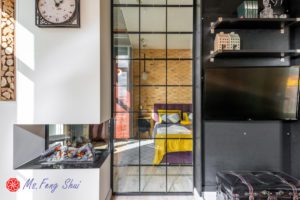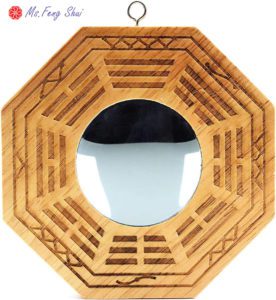Currently browsing: Home Builders
Feng Shui for Kids
Feng shui isn’t just for adults and their careers. In fact, I often help my clients improve their children’s spaces to create a positive environment for them to grow, learn, and have fun.
Here are some tips for adding feng shui into your child’s space, too:
- Choose the right colors: Colors have a big impact on our mood. Use soft colors like pastels and pale blues and greens to create a calming atmosphere in an area like a bedroom. It’s okay, on the other hand, to use more vibrant colors like red and yellow in an area that you’d like to be more stimulating, like a play room. Consider the age and personality of your child when choosing colors for each room where they’ll spend time.
- Place the bed in the right location: The bed is the single most important piece of furniture in a child’s room, as it is where they will spend most of their time. The bed should be placed in the command position, which means it should be positioned in a way that allows the child to see the door from the bed but not be directly in line with it. This helps the child feel rested, safe and secure.
- Keep the bedroom clutter-free: If your kids are simply all over the place, clutter might be the reason. Clutter can be overwhelming for children because it can create a chaotic energy in the room. Especially keep their bedroom organized and free of excess items like toys to create a calming atmosphere.
- Make the bedroom dark at night: It can be tempting to add a nightlight to a bedroom, but I advise instead to go as dark as possible. We generally sleep better in the dark. Light, whether coming from a nightlight or through a window, creates shadows and reflections, which can cause anxiety and disturb sleep. I highly suggest blackout curtains and otherwise block any light into the bedroom.
- Remove electronics in the bedroom: EMF energy from electronic devices can impact sleep, especially for children. If you want your kids to be well-rested, keep televisions, cell phones, computers, and other electronic devices out of the bedroom. My only exception might be a good quality white noise sound machine at the opposite side of the bedroom from where they sleep.
Implementing these and other feng shui recommendations will significantly help your children feel more balanced in life because they will be well-rested and energized at the appropriate times. Growing up is tough. Do what you can to help.
If you need more specific and custom guidance to improve your space and your life, I’m available to help. Learn more on my website today and book a virtual consultation. Better feng shui can help you in profound ways on life’s journey.
I am a 3rd generation feng shui expert and have helped thousands of people add harmony and balance to their homes and offices without making it look like a Chinese restaurant exploded.
I can help you attract the life that you deserve with feng shui. Contact me today!
The Importance of House Numbers in Feng Shui
In feng shui, the numbers associated with your home address (like 12345 Main St) can have a big impact on the energy of your space and well-being. By choosing the right house and/or apartment address number, you can enhance the energy of your home to bring about positive change in your life.
Calculations
First, we need to understand the two different ways address numbers can be viewed and calculated in feng shui:
- The simplest method is to simply look at the numbers of the address individually. This is especially used with repeated numbers like 444 or 888.
- The calculation most commonly used for multi-digit, seemingly random numbers is to continually add up the digits until you end up with a single-digit number. For example, with 12345 Main St, you would first add up the individual digits as 1+2+3+4+5 = 15. Because the result is not yet a single-digit number, you would add up the resulting digits as 1+5 = 6. Your resulting number of 6 is the home’s feng shui number.
Meanings
Different numbers have different meanings and associations. It’s important to have an address number that resonates with your goals. Here are some of the most common number meanings in feng shui:
- Unity, independence, and new beginnings
- Balance, harmony, and partnership
- Creativity, growth, and expansion
- Stability, security, and grounding (but, keep reading below)
- Change, adaptability, and adventure
- Love, family, and domestic harmony
- Spirituality, introspection, and inner wisdom
- Wealth, prosperity, and abundance
- Completion, fulfillment, and attainment
In particular, certain numbers are considered to be auspicious or inauspicious in feng shui. For example, the number 8 is considered to be lucky in Chinese culture. Some say it is because 8 is the infinite symbol (∞) turned sideways. As such, it is often associated with financial prosperity. Similarly, the number 9 is sometimes considered to be an auspicious number, as it is associated with fulfillment, although some will only choose a 9 address upon retirement.
On the other hand, the number 4 is often considered to be an unlucky number in feng shui, as it is associated with death and misfortune. In many Asian cultures, buildings and floors that contain the number 4 are often skipped or avoided altogether, similar to how the 13th floor is skipped in many western buildings like hotels.
Cures
When I work with home builders, we can pre-select good address numbers. But, how about when you are already living in a home that doesn’t add up to an auspicious number? One cure I provide during home consultations is to write an additional number, but have it hidden in some way. For instance, suppose your address was 229 Broadway (2+3+9=14 and 1+4=5), which adds up to 5. If you wanted to change this to an 8, you would need to add 3. You could draw a 3 in the same colored paint as your wall right next to the existing 229 or you could draw a 3 that is covered by something else like a wall tile just next to your numbers. Either way, the extra number you added would be invisible to anyone just looking at your home.
Next Steps
When it comes to applying feng shui principles to your address, paying attention to numbers can be a helpful way to create a more harmonious and balanced environment. By incorporating numbers that have positive associations and avoiding those that have negative associations, you can help to enhance the flow of energy in your space and promote greater well-being and success.
If you need more specific and custom guidance to improve your space and your life, I’m available to help. Learn more on my website today and book a virtual consultation. Better feng shui can help you in profound ways on life’s journey.
I am a 3rd generation feng shui expert and have helped thousands of people add harmony and balance to their homes and offices without making it look like a Chinese restaurant exploded.
I can help you attract the life that you deserve with feng shui. Contact me today!
Home Buying Checklist for Good Feng Shui
When the real estate market was hot, it was difficult to even get an offer in on a home, let alone be picky enough to win a bidding war for a home with good Feng Shui. With interest rates and home inventory on the rise, it’s no longer a great time to sell a home. But that’s a good thing if you’re looking to buy a home with great Feng Shui.
When I work with home builders, I advise against site plans that include cul-de-sacs, T-intersections, overhead power lines, and other Feng Shui no-no’s, especially in Feng Shui aware areas. If home builders don’t take my advice, they are often forced to significantly reduce pricing to unload their homes with bad Feng Shui. But there are several homes already on the market and we need to know which ones have good Feng Shui and which ones have bad Feng Shui.
If you’re not a believer in Feng Shui, that’s fine. Please note, however, that most of the Feng Shui suggestions I provide also have more modern and practical reasoning. Besides, if you ever intend to eventually sell a home with good Feng Shui, it’s likely to sell faster and for more money than homes with bad Feng Shui. You like money, don’t you?
The following checklist will help if you’re looking to buy or build a home and you don’t want to compromise on harmony and balance. However, this is not meant to be an exhaustive list of all that is good or bad in Feng Shui. Avoiding homes that don’t keep with the checklist below is your best option because such home issues are difficult to remedy. If I didn’t list an issue, that probably means it is relatively easy to cure later during an individualized Feng Shui consultation. Feel free to contact me if you have any questions.
Home Location
⬜ No Corner Lot: While a corner lot home may come with a little extra land, they also provide bad Feng Shui. An overwhelming amount of energy inundates corner lot homes, so they should be avoided at all costs. From a practical sense, corner lot homes also have more disturbances like car and foot traffic. More info…
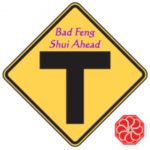
⬜ No T-Intersection: Overwhelming energy is also an issue for homes at a T-intersection, especially those at the top of the T. You’ll notice also that such homes often have concrete blocks along their sidewalks because sometimes cars end up mistakenly driving right into the house. Avoid homes at a T-intersection. More info…

⬜ No Cul-de-sac: The idea of neighborhood kids playing street hockey at the cul-de-sac can be an enticing reason to buy a home on one. But if you want to avoid potential money and health issues, I will also suggest you avoid buying a home on a cul-de-sac. On a cul-de-sac, energy sweeps through like a vortex while headlights from cars turning in front of the home cause a frequent disturbance. More info…

⬜ No EMF Radiation: If you’ve read my blog post on electromagnetic fields (EMF), you’ll know that we should probably avoid sources of electrical energy. Anecdotally, I have found that they disturb sleep. The jury is still out on several studies that may prove more harmful effects of EMF. Have you ever stood under major power lines and heard zapping or humming sounds that they emit? Yeah, I would just completely avoid homes near, and especially under, major power lines, cell towers, and other objects that radiate significant electromagnet fields that you can measure at the house. More info…
⬜ No Cliffs: You should not have a home at the top of a cliff, whether it is at the front or back of your home. While the view might be amazing, you just won’t get the positive energy you need. It would be better to have a home that backs up to a hill that is higher than your home, as this helps capture the flow of any energy headed your way. Just make sure there aren’t any loose rocks up there!
⬜ No Large Bodies of Water: Avoid large bodies of water behind your home as this will douse the Fame & Reputation Area of the home. Having a view of the lake or ocean in front of your home, however, is just fine because it supports your Career Area. Just don’t be right along the shoreline because that energy can be overwhelming.
⬜ Not Below Street Level: The vertical location of the base of the home compared to the street level is rather important in Feng Shui. The best scenario is if the bottom of the home is a little higher than the street level. We want to avoid homes that are lower than the street level because career opportunities will pass over you and because those homes are more prone to flooding.
⬜ Front Door Visible From Street: The front door should be clearly visible from the street so that positive energy can flow to your home. Objects like large trees would block visibility from the street and would therefore block energy coming into your home. If there is a small tree, see if there are any rules that would prevent you from moving it. More info…
⬜ Front Door Doesn’t Face Neighbors’ Doors: To avoid confrontations with your neighbors, make sure that your front door does not directly face any of your neighbors’ doors.
Home Shape Aligns with Bagua
⬜ Rectangular Shape: I only suggest homes that have a top-down view of the home that is generally rectangular in shape so that it can match with the Feng Shui Bagua. Otherwise, I would avoid purchasing it. More info…
⬜ Front Door Location: Make sure that the front door is aligned with the outside edge of the rectangular outline of the home. Avoid homes where the front door is recessed in much. Any parts of the home hanging out beyond the door will be outside of your Bagua.
⬜ No Missing Sections: If there is a significant section of the rectangle missing (L-shape or C-shape, for instance), you are likely missing an important section of the home’s Bagua, like your Prosperity & Wealth Corner or your Love & Relationships Corner.
⬜ No Protrusions: If a section of the home is protruding out (other than just the garage), that area will be outside of your Bagua. Anyone in that space would feel left out and any designated functions in those spaces, such as a home office, may be ineffective.
⬜ No Open-Air Courtyards: If you have an open-air courtyard in the middle of your home, you are likely missing an important section of the home’s Bagua for your Health Area.
Inside the Home
⬜ No Front & Back Door Alignment: Try to avoid homes where the front door directly lines up with the back door in your sightline because your energy will just flow right out the back. More info…
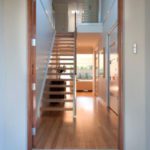
⬜ Front Door Energy Flow: If you don’t want your energy to go down the drain, you do not want to see a bathroom or the kitchen when you open your front door. When you open your door to walk in the home, you should not immediately face stairs, another door, or a wall because you want energy to flow more freely through the downstairs areas.
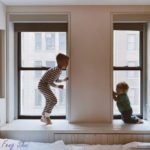
⬜ Bedrooms in Back: In general, all bedrooms should be in the back part of the house. This is especially important for small children in your family. If you want calm, rested children, having them see the street from their bedrooms might be counterproductive. More info…

⬜ No Spiral or Grand Staircases: Consider a spiral staircase to be like a corkscrew, harmfully digging into a particular section of the Bagua in the home or office. Because of their often-circular nature, any energy that flows up the left side of a grand staircase just goes right back down the right staircase, completely bypassing much of the second floor of the home. More info…
Next Steps
⬜ Make an Offer: Timing is sometimes of the essence when making an offer on a house, but that doesn’t mean you should rush through a purchase without doing your due diligence. Make an offer with an inspection contingency, during which time you can make sure that the house is perfect as a home. More info…

⬜ Schedule a Feng Shui Review: Contact me to schedule a review before removing contingencies. This way, we can confirm that there aren’t any other major issues to be concerned with before you commit to the purchase. More info…
The information here is rather thorough. When you’re shopping for a home, here is a printable PDF version of this checklist.
Through my inexpensive Feng Shui Real Estate Review, I have helped thousands of people analyze homes they are looking to potentially buy to make sure they are getting a house with great Feng Shui. I also provide more thorough Feng Shui consultations for recently purchased homes without requiring investment in a bunch of silly trinkets. I can do the same for you with a Feng Shui Video Consultation.
Is it Good Feng Shui to Have a Fireplace in the Bedroom?
Fireplaces can add warmth, aroma, and ambiance to your room, but is it good feng shui to have a fireplace specifically in your bedroom? My short answer is generally no. In fact, when I work with home builders, I always suggest they remove plans to automatically include a fireplace in any bedroom.
Here are a few reasons why it is bad feng shui to have a fireplace in your bedroom:
- Fireplaces provide exciting energy. In feng shui, fire is associated with passion, excitement, and transformation. These can certainly be positive qualities in some areas of your home, but not here. Your bedroom is a space to get some rest and relaxation.
- Fireplaces can be a safety hazard. A fireplace increases the risk of fire in your home. Even if you don’t actively use your bedroom fireplace, it can create an unconscious sense of stress, which certainly doesn’t help you relax. Certainly never fall asleep with a fireplace on.
- Fireplaces can disrupt sleep. Heat and light emitted by your bedroom fireplace can interfere with your precious sleep. Your bedroom should be cool, dark, and quiet to help promote sleep. Fireplaces, however, can disrupt this balance.
So, what are some cures? Removing the fireplace altogether just isn’t usually practical. When I consult with my individual clients who already have a fireplace in their bedroom, we work together to try to mitigate its negative effects. A couple of suggestions include using a fireplace screen and keeping it turned off when not in use. I also suggest balancing the energy of the space by using other feng shui techniques, such as incorporating natural elements, a carefully-placed painting of calm water, or the use of soothing colors.
If you need more specific and custom guidance to improve your space and your life, I’m available to help. Learn more on my website today and book a virtual consultation. Better feng shui can help you in profound ways on life’s journey.
I am a 3rd generation feng shui expert and have helped thousands of people add harmony and balance to their homes and offices without making it look like a Chinese restaurant exploded.
I can help you attract the life that you deserve with feng shui. Contact me today
Using Convex Bagua Mirrors in Feng Shui
Convex bagua mirrors are a tool often used in feng shui to deflect negative energy. By deflecting negative energy, they may help prevent accidents, protect against theft, and calm overwhelming feelings.
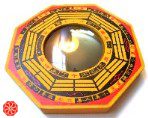
Convex bagua mirrors are specifically shaped like an octagon. Each side and the center of the octagon represents one of the nine areas of the bagua, which in turn represent different aspects of life, including wealth, career, relationships, and health.
When I work with home builders, I advise them on creating housing developments that are most auspicious for future residents. We’ll work together to avoid or minimize homes located at T-intersections, the end of a cul-de-sac, corner lots, and in other situations where a home has poison arrows pointed at it.
If you already live in a home with any of these situations, however, there are often remedies. When I consult with homeowners, we’ll identify areas of concern and I will advise specific cures, which may include a convex bagua mirror.
There are several ways to use convex bagua mirrors in feng shui. One common placement is to hang the mirror just above the front door, facing outward. This is believed to deflect negative energy and protect the home from negative influences. If you have poison arrows facing toward your window, you may hang the mirror above the window, again, facing outward to deflect negative energy from the outside. Whether with a door or window, the mirror could be inside or outside of the wall as long as the reflective part of the mirror is facing outwards towards the negative energy.
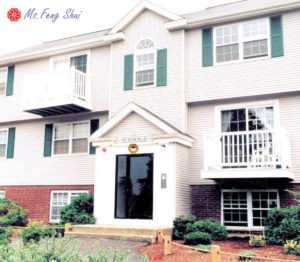
Please ONLY use convex bagua mirrors for protection and NEVER use them to intentionally harm or bring negativity to others. Use them with caution, as they can be very powerful and can even reflect or amplify negative energy back at you if used incorrectly.
If you’re interested in using convex bagua mirrors for feng shui in your home or business, it’s important to consult with a feng shui expert to determine the best placement for maximum protection. When you use and place them appropriately, convex bagua mirrors can provide you with powerful protection by bringing positive energy to your space.
Click here for a referral link to a convex bagua mirror that I suggest to my clients.
If you need more specific and custom guidance to improve your space and your life, I’m available to help. Learn more on my website today and book a virtual consultation. Better feng shui can help you in profound ways on life’s journey.
I am a 3rd generation feng shui expert and have helped thousands of people add harmony and balance to their homes and offices without making it look like a Chinese restaurant exploded.
I can help you attract the life that you deserve with feng shui. Contact me today
What to Know About Asian Homebuyers
From NewHomeSource Professional

When working with Asian homebuyers, belief systems like Feng Shui and Vastu could affect the way they invest in new homes.
In major population hubs like New York City, San Francisco and Los Angeles, this trend is especially apparent as these investors indicate an outbound capital flow from their home countries by investing in American industries like agriculture, technology and, of course, real estate.
In fact, Forbes reports that Chinese nationals have become the largest foreign buyers of American homes. In this industry, home purchases by China’s new wealthy class have grown to a staggering $93 billion in value, with $29 billion coming in 2015 alone.
So, with evidence pointing to this surge in Asian national buyers, you may be thinking: “How can I help this type of client find a new home that suits their needs?”
While Asia is a giant continent with numerous countries with their own cultural beliefs, there may be a few considerations you’ll want to have in mind when assisting Asian homebuyers.
Take the Time to Understand Their Customs
Many homebuyers coming from Asian countries have customs and belief systems that directly affect the homes they can buy — from the direction the home is facing to the history of the land it is built upon.
Two common belief systems to keep in mind with some Asian buyers are Feng Shui and Vastu, which have certain rules regarding a home’s architecture and energy flow.
“Realtors dealing with newly built homes should know the site layouts and designs,” says Jessie Kim, a Feng Shui consultant in Southern California who often works with homebuilders and investors on catering to this Chinese philosophy. “What is going to be built around the properties, home addresses and what types of landscaping plans and materials will be used around the homes are important things to consider.”
With Feng Shui, some common things to avoid are “T” intersections, cul-de-sacs, corner lots, a front door facing the back door or window, stairs and bathrooms facing the front door, kitchens and bathrooms facing or back-to-back to each other and bathrooms directly above the kitchen. You’ll also want to focus on showing homes with a front door that faces south or southeast.
“There are ways to remedy most of these issues, but the less Feng Shui remedies you have to do to the house, the better the home is,” says Kim.
And with Vastu, a Hindu architecture system, the direction of the front door is also very important, as well as having a dedicated space for spiritual statues.
“Just like with Feng Shui, there are different layers that the buyers will be considering, so it’s important to ask the what their Vastu needs and wants are, besides just asking for the number of bedrooms and bathrooms they want in their home,” advises Kim.
A simple question-and-answer session with your clients can help bring to light any of these cultural beliefs and requirements so you can find a home that suits them perfectly.
“Just try to learn about their custom,” adds Kim. “Simple things like taking off your shoes when entering their home will make the homeowners feel comfortable that you are understanding of their culture.”
Discover Their Reason for Buying
The next tip is a simple one: Just find out why they are buying.
“You have to think about what their reasoning is,” says Joan Brothers, president of Manhattan Boutique Real Estate in New York. “And there’s a lot of different reasons why people are coming from Asia to the United States and buying real estate as assets, whether they’re using it for their residential property or as an investment.”
With Chinese investors specifically, there are different levels of buyers. For years, wealthy buyers have been looking to foreign countries to invest their money and now the middle class have been increasingly doing the same thing.
“The main thing will be to send their children to school out of their country,” says Kim. “So by investing in a home in the U.S., they are able to set up residence and when their children are older, they are able to go to school in the U.S. without having to be an international student.”
Having insight to what they want in a new home, whether it be for a residence for their family or just as an investment asset, can better enable you to find a property that fits their needs.
“And diversifying assets is a really good thing to do,” adds Brothers. “It’s either family or business, personal use or for investment.”
Family-Friendly Values
And if you discover that they are looking for a home to set up residence, the next thing to consider is their family values.
“These types of buyers are looking for a home that they can ‘share’ with their family,” says Kim. “Maybe not full time, but they are always aware of possibilities of their families coming to visit and staying with them for extended periods of time.”
So, it may be important to find them a home with an extra bedroom on the ground level or options for multigenerational living. Close proximity to parks, shopping and schools with good ratings would be another major plus, adds Kim.
It’s also wise to make sure you keep everyone involved in the process feeling just that — that they are involved.
“Buying a home is mostly a family decision,” says Sylvia Yang, a sales representative for Brookfield Residential in Azusa, Calif. “Parents and grandparents will often gift the down payment and they need to confirm they like the location and floor plan as well.”
Tying it all together, it really comes down to genuine and personal conversation and asking questions.
“If you can make simple conversation and are interested in the client’s culture, you can create trust and a long-term relationship with them,” says Brothers.
Drew Knight is the Digital Content Associate for Builders Digital Experience (BDX). You can find him online at LinkedIn.
Jessie Kim is a 3rd-generation certified Feng Shui consultant and experienced real estate investor that frequently works with home builders. You can find her online at www.msfengshui.com.
Originally posted at:

